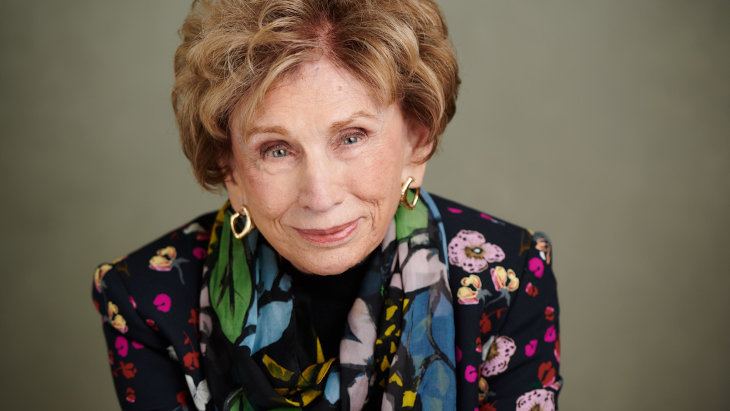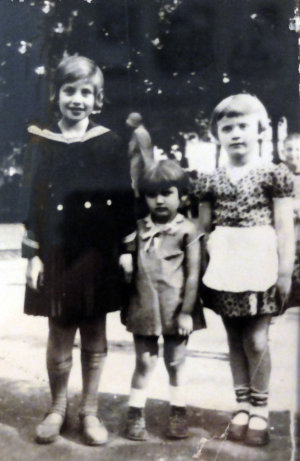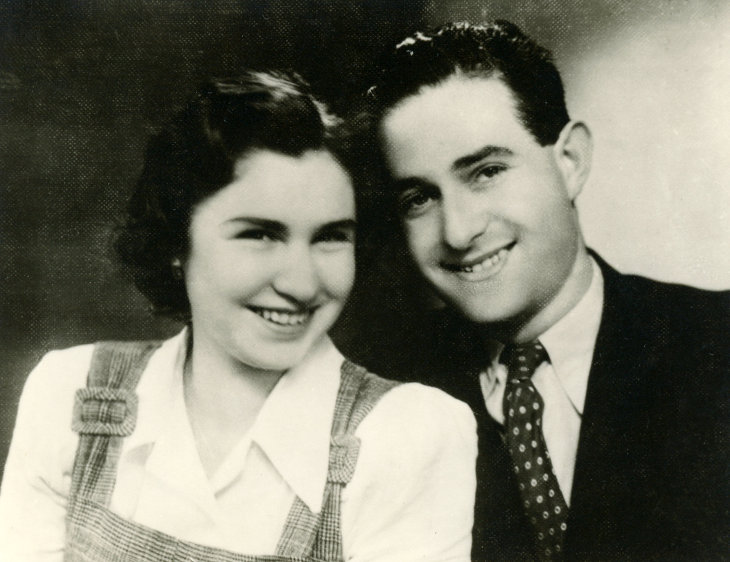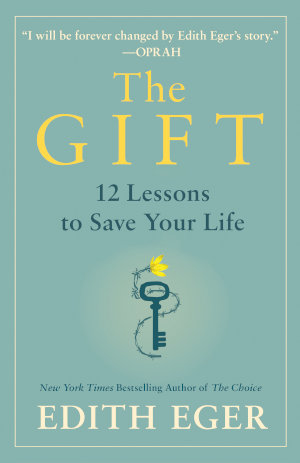 Iran’s Attack on Israel
Iran’s Attack on Israel


8 min read
Dr. Edith Eger offers keys to free ourselves from our own prisons of the mind.
She’s about 6 years old, delighting in her body’s strength, flexibility and grace – and stretching into a full split. Edith Eger’s Hungarian ballet master claps with joy then lifts her off the ground and over his head.
“Editke,” he says, “all your ecstasy in life is going to come from the inside.” The young dancer will remember those words and a similar refrain by her mother years later when she comes face to face with Dr. Josef Mengele, the infamous Angel of Death, in Auschwitz.
 Three sisters: Magda, Edie, and Klara
Three sisters: Magda, Edie, and Klara
The youngest of three girls, Edie Eger grew up in Kassa, Hungary, one of Europe’s largest Jewish communities, which became Kosice with the creation of Czechoslovakia. Her mother made clear she would never be beautiful like Magda, the oldest sister. Klara, the middle sister and violin prodigy, had the talent; she was the only Jewish girl accepted by the music conservatory in Budapest. Edie had the brains.
At her family’s Passover Seder. Edie, 16, is asking the four questions At the end of the meal, her father cries and kisses Magda and Edie on the head. Klara, forewarned, has stayed in Budapest. In the middle of the night German soldiers pound on their door, storm into the bedroom and spirit the family away to a brickworks factory with other interned Jews. Edie wears a blue silk dress with bows. They are allowed one suitcase for four people.
"Just remember, no one can take away from you what you’ve put in your mind.”
Weeks later in a dark crowded train bound for Auschwitz, her mother tells Edie, “We don’t know where we’re going. We don’t know what’s going to happen. Just remember, no one can take away from you what you’ve put in your mind.”
When the cattle car doors open in May 1944, a sign proclaiming “Arbeit Macht Frei” greets the Jews of Kosice. The Nazis separate them into men’s and women’s lines. Edie doesn’t realize she will never see her father again. Mengele commands her mother to go to the left. “You’re going to see your mother very soon. She’s just going to take a shower,” he says ominously.
A female kapo coldly dashes Eger’s hopes. Pointing to smoke from distant chimneys, she says, “Your mother is burning in there.”
Staring at the chimney atop the building their mother had entered, her sister Magda reassures her, “The soul never dies.”
“I heard every day that I was never going to get out alive,” Eger recalled in a recent Zoom lecture hosted by Chabad Intown Atlanta. When hopelessness overwhelmed her, she thought of her mother’s words as they pressed together in the dark crowded cattle car. “No one can take away from you what you’ve put in your mind.”
She thought of her boyfriend and their picnics by the river, envisioning the future they had planned. She focused on helping her sister Magda survive the hell in which they found themselves.
Commanded to entertain Mengele with a ballet performance, Eger imagined herself dancing for fans at the Budapest opera house. By some miracle, she was able to view the seasoned killer before her as a pitiful prisoner of his evil choices. She was free in her mind, which he could never be. Her performance netted her a loaf of bread – which she shared with Magda and their bunkmates, a gesture that would later save her life. They would lift her up when she stumbled on a death march to a subcamp of Mauthausen, too weak to walk.
 Edith and Bela
Edith and Bela
In May 1945, American soldiers discovered her lying in an Austrian forest, barely alive beneath a pile of dead bodies, with a broken back, typhoid fever, pneumonia and pleurisy. After a year when her body had healed, she married Bela Eger – a Hungarian man she had met in a tuberculosis hospital in the Tatra Mountains – and became a mother. Healing her mind, however, would take much longer. It became her passion and vocation after they settled in the United States.
In her first book, The Choice, which she wrote at age 90, Dr. Edith Eger recounted her life before the Holocaust, when she was training for the Olympics as a gymnast, and after the war, when she reared a family, went to college and earned a doctorate in clinical psychology. The energetic great-grandmother maintains a busy clinical practice and holds a faculty appointment at the University of California, San Diego. She also serves as a consultant for the U.S. Army and Navy in resiliency training and the treatment of post-traumatic stress disorder.

Eger has been called a testament to the resilience of the human spirit and the power of choice in our lives.
“I’ll be forever changed by her story,” Oprah Winfrey says.
Eger’s new book, The Gift: 12 Lessons to Save Your Life, released in September, serves as a practical guide to the healing she has done in her own life and with patients in her clinical work.
In each chapter she explores a common prison of the mind, closing with the keys to free ourselves.
For instance, in “No Prozac at Auschwitz,” she reminds readers that the opposite of depression is expression, and encourages us to feel so we can heal. As she says, “What comes out of you doesn’t make you sick; what stays in there does.”
The title of the chapter came from one of her patients, a physician addicted to prescription drugs. He said he had realized there was no Prozac at Auschwitz – no way to self-medicate, numb out, forget the pain of hunger, torture and imminent death.
In an exclusive interview with Aish.com, Eger quipped, “I tell people don’t call me ‘shrink,’ call me ‘stretch.’ I stretch people’s comfort zones. I ask you to face all your fears, because fear and love don’t co-exist.”
The 5-foot ballerina with twinkling eyes and glowing face takes her own advice. “For many years I had tremendous problems with anger,” she admits. “Forgiveness is release, and I couldn’t let go until I gave myself permission to feel and express my rage. I finally asked my therapist to sit on me, to hold me down so I had a force to push against, so I could release a primal scream.”
"The worst prison is not the one the Nazis put me in. The worst prison is the one I built for myself.”
In Eger’s world, there is no forgiveness without rage. Whatever imprisons our minds, we must go through the valley of the shadow of death and not become stuck there. She explains: “Forgiveness is a gift you give to yourself, not allowing the past to rule your life. While suffering is inevitable and universal, we can always choose how we respond… We can choose to be our own jailors, or we can choose to be free.”
She continues, “It may seem wrong to call anything that came out of the death camps a gift. I am here to tell you that the worst prison is not the one the Nazis put me in. The worst prison is the one I built for myself.”
Surprisingly, Eger says she found God in Auschwitz. “My God was with me. I look at Auschwitz as an opportunity to discover my inner resources and to become closer and closer to my God.”
The elegant La Jolla psychologist credits God with transforming her hatred into pity, to helping her feel sorry for the guards and view them as the actual prisoners. “They were born to be beautiful and have joy and love and passion for life. But they were taught to see Jews as a cancer to society.”
Many decades later, a fellow ballerina validated Eger’s perspective. On May 4, 2019, the 74th anniversary of her liberation and a national day of remembrance in the Netherlands, Eger spoke at the Anne Frank House in Amsterdam. Then she watched Igone de Jongh, the prima ballerina of the Dutch National Ballet, perform a piece inspired by Eger’s first night in Auschwitz when she danced for Mengele.
Calling the Dutch ballet one of the most cherished experiences of her life, Eger was awed by the depiction of beauty and transcendence – in hell. Mengele appeared to be a hungry ghost, sad and empty, trapped by his need for power and control.
 Flowers from Igone de Jongh
Flowers from Igone de Jongh
At the end, de Jongh descended from the stage and walked directly to Eger. With tears in her eyes, the ballerina embraced the Holocaust survivor and gave her a huge bouquet. The audience roared with applause and a standing ovation.
Eger continues to dance through life, happy to perform her signature ballet high kick after her talks. She will celebrate her 93rd birthday Sept. 29. “I will never retire,” she declares. “The meaning in life is when you can be useful. The only way I think I survived is that I can serve others.”
